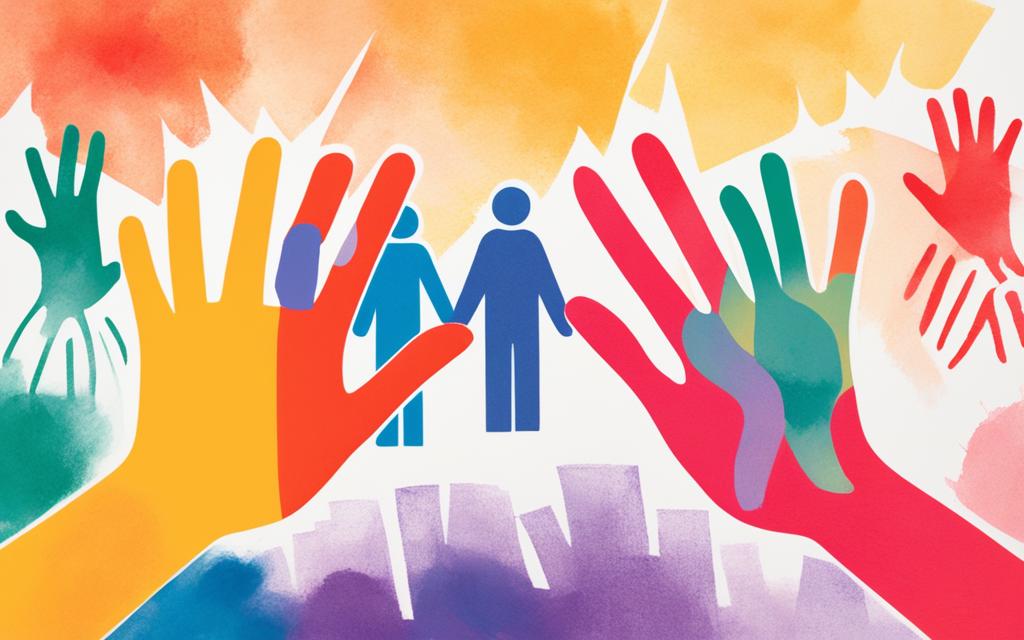Understanding the Role of a Caregiver Explained
Navigating health and personal care? Knowing the role of a caregiver is key. These heroes support those with illness, disability, or age issues. They’re vital, ensuring their people live with dignity and compassion.
Get ready to dive deep into the world of caregivers. This guide celebrates their hard work and loyalty. It highlights their role and salutes their priceless role in health and happiness.
Key Takeaways
- Gain a fundamental understanding of the role of a caregiver.
- Discover why recognizing the importance of caregivers is crucial for societal health.
- Learn about the compassionate dedication that defines caregiving.
- Explore the depth and breadth of responsibilities handled by caregivers.
- Acknowledge the emotional, physical, and social support caregivers provide.
Introduction to Caregiving
Becoming a caregiver may look simple at first. Yet, it involves many critical duties that help maintain the well-being of people needing care. These roles vary widely, whether it’s helping within the family or in a formal care setting.
What is a Caregiver?
A caregiver helps someone else with their daily life, health, and personal needs. They might aid elderly parents or those with chronic conditions or disabilities. Their work meets the physical, emotional, and social needs of the person they’re caring for.
The Growing Need for Caregivers
With more elderly people and rising chronic disease rates, we need more caregivers. Understanding caregiver duties has never been more important. Now, caregivers are key in the healthcare system. They provide not only practical help but also emotional support, improving quality of life.
Defining the Role of a Caregiver
When you start your journey in caregiving, it’s important to know what responsibilities you’ll have. Caregivers do more than just look after someone. They are key to the daily life of people who need help. This job changes depending on what the person needs, including their health and emotions.
- Physical Support: This means helping with things like bathing, getting dressed, and moving around.
- Emotional Support: It’s about being a friend and keeping their mind active. This helps keep their emotions in balance.
- Logistical Support: It involves organizing medical visits, diet plans, and when to take medicine.
A caregiver has to be strong, flexible, and very committed. The needs of those they care for can change a lot from one day to the next. Being able to adjust is really important. It helps give the people they care for a stable and comfortable life.
| Aspect of Care | Responsibilities | Required Supports |
|---|---|---|
| Physical | Daily living assistance | Physical aids, healthcare consultations |
| Emotional | Companionship, emotional stability | Psychological expertise, community resources |
| Logistical | Schedule management, transportation | Organizational tools, network support |
If you are helping a family member who is sick or you work in a care place, knowing and doing these tasks well is key. It makes life better for those you look after. It’s also important to keep learning and use caregiver support systems. This helps you and the person you’re caring for to stay well.
A Day in the Life of a Caregiver
Imagine the day of a caregiver as a mix of crucial tasks and flexibility. They’re driven by a strong sense of devotion. Each day begins with essential tasks vital for caregiving. These tasks involve managing daily needs and facing new challenges.
Typical Caregiver Duties and Responsibilities
The most important tasks for caregivers relate to health and personal care. They handle giving medications, helping with moving around, and ensuring the person they care for eats well. Each task is specially designed to meet the unique needs of the person they’re supporting. Caregivers also do housework, set up medical appointments, and keep the person safe. These tasks require great organization and attention to every detail.
Adapting to the Varied Needs of the Care Recipient
- Personalizing Care Plans: Caregivers change care plans as the health and likes of the person they support change.
- Emotional Support: They provide important emotional support and friendship. This shows how essential their interpersonal skills are.
A caregiver’s day includes many different responsibilities. They’re all about improving the person’s well-being and life quality. Juggling these tasks and responding with caring and efficiency shows how caregivers make a big difference in the lives of those they help.
Essential Caregiver Qualities and Skills
Effective caregiving goes beyond just doing tasks. It’s about creating a caring space where respect meets need. It’s important to know the core caregiver qualities. Including caregiver training is crucial. It helps improve these qualities.
- Empathy: Being able to feel what others feel is key in caregiving. This connection helps caregivers give care that is thoughtful and right for the person.
- Reliability: It’s important for caregivers to be someone you can count on. Families and care getters depend on their caregiver being there regularly.
- Communication Skills: Speaking clearly and kindly helps build strong relationships. It ensures the well-being of those cared for is watched and managed well.
- Problem-Solving Abilities: Sometimes, caregivers face unexpected problems. Being able to solve these problems quickly and well is a must. This skill gets better with practice and training.
Adding caregiver training can make a big difference. Training sharpens skills needed in caregiving. It also teaches how to respond in emergencies and gives the latest info on medical or psychological needs of those cared for.
| Caregiver Quality | Skills Enhanced Through Training |
|---|---|
| Empathy | Advanced communication, dealing with different emotions |
| Reliability | Keeping to schedules, making ethical choices |
| Communication | Solving conflicts, better talking skills, keeping good records |
| Problem-Solving | Thinking clearly, caring in emergencies, adapting care to needs |
Uniting caregiver qualities with professional caregiver training raises the level of care. It ensures caregivers can face their important tasks well-prepared.
The Importance of Caregivers in Healthcare
The role of a caregiver in healthcare is much more than helping with daily tasks. Caregivers are vital in the healthcare world, providing support that covers all aspects of a patient’s care. They offer both physical assistance and emotional support, which is key in improving patient results.
Supporting Patients Beyond Medical Needs
Caregivers give more than just routine care. They also meet the emotional and psychological needs of patients. This all-around care has a big impact, helping patients heal better and feel well.
Strong caregiver support systems are important. They help caregivers give complex care needed by patients. This is key in handling the many aspects of patient care.
Collaborating with Healthcare Professionals
It’s key for caregivers and medical staff to work together. This teamwork ensures care continues smoothly from clinic to home. It makes sure the patient’s health plan works well at home.
This partnership is made better by solid caregiver support systems. These systems offer tools and resources that improve communication and aid caregiving.
The vital role of a caregiver in healthcare shows the need for good training and support. By boosting these areas, patient care outcomes can greatly improve.
Caregiver Job Description and Types of Caregiving
Understanding the role of caregivers and the different types can help those starting in this field. It’s also useful for those who want to know more about the care their loved ones receive.
Differentiating Between Professional and Informal Caregiving
Professional caregivers work in medical settings or with caregiving agencies. They follow medical and ethical guidelines in their work. They are trained to care for people’s physical and emotional needs.
Informal caregivers are usually friends or family who provide care without training. Their care is based on personal ties, not professional agreements.
Specialized Caregiving Roles
There are caregivers trained for specific needs. Some focus on helping individuals with dementia and understand their conditions well. Others specialize in caring for those with disabilities, aiding with daily tasks and overcoming challenges.
To better explain the caregiver’s duties, it’s important to outline the needed skills and emotional strength. This helps future caregivers see where they might do best.
Understanding Caregiver Responsibilities
As a caregiver, you do more than keep someone company. Your role is filled with important tasks that help keep the person you care for healthy and happy. Knowing caregiver duties and caregiver responsibilities well can really improve the care you give.
One big job is making sure the person takes their medicine right and on time. This is huge because it affects their health directly.
Getting them to doctor’s appointments ensures they get professional health check-ups regularly. Helping with meals means planning and making dishes that are nutritious and meet their health needs.
Helping with bathing, getting dressed, and grooming is also key. It helps the person keep their dignity and independence.
- Transportation to medical appointments, which guarantees that the care recipient receives professional medical evaluations and maintains their health regimen.
- Nutritional support to aid in the preparation and planning of healthy meals that meet the dietary needs of the care recipient.
- Assistance with daily living activities such as bathing, dressing, and grooming, which preserves the dignity and autonomy of the individual.
| Caregiver Task | Importance |
|---|---|
| Medication Management | Ensures proper health and prevents complications |
| Transportation | Access to necessary medical care |
| Nutritional Support | Supports overall health and well-being |
| Daily Living Assistance | Preserves independence and respect |
Each caregiver responsibility supports both the physical and mental wellness of the cared-for person. By taking on these tasks, caregivers are key to their charge’s life.
Emotional and Social Aspects of Caregiving
Caregiving involves more than just physical tasks. It brings emotional and social elements into play. These elements impact both the caregiver and the one receiving care. They form the base of trust and friendship, making the caregiving path smoother.
The Psychological Impact on Both Caregiver and Care Recipient
Caregiving can be hard, causing stress and even burnout. It’s important to understand this impact. Support for caregivers helps them deal with stress. This makes caregiving better for both the caregiver and the person receiving care.
The emotional health of those being cared for is tied to their relationship with their caregiver. Being positive and understanding greatly boosts their mood. This leads to a better life quality.
Building Trust and Companionship
Trust and friendship are key in caregiving. They improve the way caregivers and receivers interact. These elements make the caregiving environment safer and more comforting.
Trust makes care receivers feel heard and valued. This is crucial for providing effective care.
Check out the scores for how well different caregiving settings build trust and companionship:
| Setting | Trust Building | Companionship |
|---|---|---|
| Home Care | High | High |
| Nursing Homes | Medium | Medium |
| Hospitals | Low | Low |
Support programs for caregivers need to focus on the psychological aspects. They should promote actions that build trust and friendship in all caregiving scenes.
Financial and Legal Considerations for Caregivers
Being a caregiver means you need to know about money and law stuff. This keeps everyone safe and makes sure you’re doing things right. Learning about money handling and legal rules is very important.
Managing Care Recipient’s Financial Affairs
Looking after someone’s money is more than just watching what comes in and goes out. You have to be really careful and make sure everything is legal and clear. Here are the main things to keep an eye on:
- Bill payments and monitoring bank accounts
- Investment oversight
- Budgeting for daily needs and potential medical costs
Navigating Legal Responsibilities and Rights
Knowing your legal duties as a caregiver is key to protecting you and the person you’re caring for. Learn about these important legal tools:
- Power of Attorney
- Guardianship
- Advance healthcare directives
Getting to know these topics well helps avoid legal troubles. It also makes sure your choices are legally solid.
| Legal Document | Function | Importance for Caregivers |
|---|---|---|
| Power of Attorney | Gives you authority to make financial decisions | Essential for managing finances when the care recipient cannot |
| Guardianship | Allows you to make personal and health care decisions | Important when care recipients are unable to make their own decisions |
| Advance Healthcare Directives | Provides instructions for future healthcare | Ensures the care recipient’s health care wishes are followed |
The Challenges and Rewards of Being a Caregiver
Starting the caregiving journey is tough but rewarding. It helps to know the role’s challenges to avoid caregiver burnout. At the same time, we should celebrate the joys of caregiving.
Addressing Caregiver Burnout and Stress
Caregiver burnout means feeling totally spent – physically, emotionally, and mentally. It happens when caregivers don’t get needed support or overextend themselves. To manage burnout, spotting its signs is crucial:
- Persistent fatigue or exhaustion
- Feeling overwhelmed or constantly worried
- Changes in sleep patterns
- Decreased interest in activities previously enjoyed
There are ways to deal with stress that really work. These steps can make a big difference:
- Set real goals and know when to ask for help
- Join support groups to share experiences and advice
- Look after yourself by sleeping well, eating right, and exercising
- Get professional help if depression kicks in
Finding Fulfillment in Caregiving
The tough parts of caregiving come with big rewards. Many caregivers feel deeply satisfied by helping someone else. Caregiving brings many unseen benefits:
| Aspect | Benefits |
|---|---|
| Emotional | Increases empathy and strengthens bonds |
| Physical | Improves own health through active caregiving tasks |
| Psychological | Provides a sense of purpose and fulfillment |
| Social | Expands social circles through networks and groups |
Knowing these benefits can help caregivers appreciate the value of their hard work and love.
How to Access Caregiver Support and Resources
Finding the right support and resources makes caregiving easier. Whether you’re new or have experience, getting involved in caregiver communities and training programs is key. This helps you handle your responsibilities better.
Local and Online Caregiver Communities
Joining caregiver communities lets you share experiences and learn from others. You can find new resources and emotional support. These groups are both local and online. They provide workshops and social events to reduce feelings of isolation.
Utilizing Available Caregiver Training Programs
Improving your skills with caregiver training is vital for quality care. These programs teach everything from basic care to handling complex conditions. By learning more, you become more competent and confident in your role.
| Resource Type | Description | Benefits |
|---|---|---|
| Online Forums | Platforms for caregivers to connect and discuss experiences. | Accessible support, sharing of practical advice, and emotional comfort. |
| Local Support Groups | Regular meetings with other caregivers in the community. | Real-life interactions, local resource sharing, mutual support. |
| Caregiver Training Workshops | Educational sessions focusing on caregiver skills enhancement. | Skills development, better caregiving practices, professional advice. |
Developing Effective Caregiver Communication Strategies
In caregiving, learning how to communicate well is key. It’s also a big challenge. Whether talking to the person you’re caring for or working with doctors and family, how you talk matters a lot. Good communication can make the care better.
Improving Interactions with Care Recipients
To get better at talking with those you care for, it helps to understand them. Pay attention to the things they don’t say out loud. Changing how you talk based on their needs makes a big difference. Being clear, patient, and kind helps a lot. It makes care easier and less stressful for everyone.

Liaising with Medical Staff and Families
Talking with doctors and family needs a straight-to-the-point method. This keeps everyone up to date on the patient’s situation and care plans. It’s important to share news often, plan meetings, and use easy words. This way, everyone knows what’s going on with the health and care of the loved one.
| Communication Aspect | Strategy | Benefits |
|---|---|---|
| Empathy and listening | Active listening, reflecting emotions | Builds trust, eases emotional burdens |
| Clarity and simplicity | Use of simple language, avoidance of medical jargon when possible | Enhances understanding, minimizes miscommunication |
| Consistency | Regular updates, adherence to communication plans | Ensures everyone is on the same page, fosters professional trust |
Conclusion
Caregivers play a vital role in people’s lives. We’ve looked at their daily tasks and the deep emotional care they provide. We’ve also talked about the skills they need and how they work with health systems. Their work is truly important, showing both compassion and strong support.
Caregivers greatly improve lives. This article showed the hard parts of their job, like stress, and the good parts, like feeling fulfilled. As the world changes, we need more caregivers. It’s important to give them the support and resources they need for their important work.
It’s key to understand that caregivers offer more than just physical help. They also provide mental and emotional support. This impact is felt by families, communities, and throughout healthcare. By supporting caregivers, we improve care quality and everyone’s well-being.
FAQ
What is the role of a caregiver?
A caregiver helps those who can’t fully care for themselves. They help with daily tasks, emotional support, and health services. Their job improves the life quality of those in need. Caregivers are key in offering care that goes beyond just medical needs.
What are the primary responsibilities of a caregiver?
Caregivers manage medications, help with personal care, provide nutritional support, and offer transportation. They also give companionship. Caregivers coordinate health services and may help with finances or legal matters.
What qualities and skills are essential for a caregiver?
Important traits for caregivers include empathy, patience, and reliability. Good communication and problem-solving skills are crucial. They must be adaptable and compassionate. Some caregivers get formal training to improve their skills.
How do caregivers support patients beyond their medical needs?
Beyond medical care, caregivers offer emotional support and company. They help maintain stability in the patient’s life. This includes engaging in hobbies or activities that enhance life quality.
What are the differences between professional and informal caregiving?
Professional caregivers are trained and often work for organizations. They might focus on specific types of care. Informal caregivers are usually family or friends without formal training. They provide care out of commitment or necessity.
What are some specialized caregiving roles?
Specialized caregiving roles focus on specific conditions like dementia or chronic illnesses. These roles require special training and understanding of the challenges faced.
What is the psychological impact of caregiving on both the caregiver and care recipient?
Caregiving can cause stress and emotional tiredness in caregivers. Care recipients may feel grateful but also struggle with dependency. Making a supportive relationship helps manage the emotional impact for both.
How can caregivers manage their legal responsibilities and rights?
Caregivers should know about legal documents and laws. Getting legal advice is crucial. This ensures their actions are legal and both parties’ rights are protected.
What resources are available to support caregivers?
There are many resources like community groups, training programs, and respite care. These support caregivers in various ways. They can be found through healthcare providers and caregiver organizations.
How can caregivers develop effective communication strategies?
Good communication needs active listening and patience. Knowing the needs and preferences of the care recipient is key. Maintaining open communication with medical staff and family is also essential.







